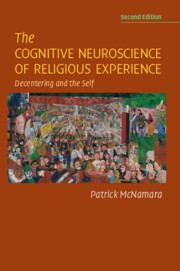Book contents
- The Cognitive Neuroscience of Religious Experience
- The Cognitive Neuroscience of Religious Experience
- Copyright page
- Dedication
- Contents
- Preface to Second Edition
- Acknowledgments
- Chapter 1 Introduction
- Chapter 2 On Decentering
- Chapter 3 On the Self and the Divided Self
- Chapter 4 The Cultural and Evolutionary Background to the Neuroscience of Religion
- Chapter 5 Neurology of Religious Experiences
- Chapter 6 Psychedelics and Religious Experiences
- Chapter 7 Mystical Experiences
- Chapter 8 Religious Experiences and Transformative Experiences
- Chapter 9 Supernatural Agents and God Concepts
- Chapter 10 Ritual
- Chapter 11 Religious Language
- Chapter 12 Group Effects and Religion
- References
- Index
Chapter 5 - Neurology of Religious Experiences
Published online by Cambridge University Press: 02 June 2022
- The Cognitive Neuroscience of Religious Experience
- The Cognitive Neuroscience of Religious Experience
- Copyright page
- Dedication
- Contents
- Preface to Second Edition
- Acknowledgments
- Chapter 1 Introduction
- Chapter 2 On Decentering
- Chapter 3 On the Self and the Divided Self
- Chapter 4 The Cultural and Evolutionary Background to the Neuroscience of Religion
- Chapter 5 Neurology of Religious Experiences
- Chapter 6 Psychedelics and Religious Experiences
- Chapter 7 Mystical Experiences
- Chapter 8 Religious Experiences and Transformative Experiences
- Chapter 9 Supernatural Agents and God Concepts
- Chapter 10 Ritual
- Chapter 11 Religious Language
- Chapter 12 Group Effects and Religion
- References
- Index
Summary
The Cognitive Neuroscience of Religious Experience, now updated and expanded in a new edition, updates key topics covered in the first edition including: decentering and self-transformation, supernatural agent cognitions, mystical states, religious language, ritualization and religious group agency. It expands upon the first edition to include major findings on the brain and religious experience over the past decade, focusing on methodology, future thinking and psychedelics. It provides an up-to-date review of brain-based accounts of religious experiences, and systematically examines the rationale for utilizing neuroscience approaches to religion. While it is primarily intended for religious studies scholars, people interested in comparative religion, philosophy of religion, cultural evolution and personal self-transformation will find an account of how such transformation is accomplished within religious contexts.
Keywords
- Type
- Chapter
- Information
- The Cognitive Neuroscience of Religious ExperienceDecentering and the Self, pp. 94 - 124Publisher: Cambridge University PressPrint publication year: 2022

